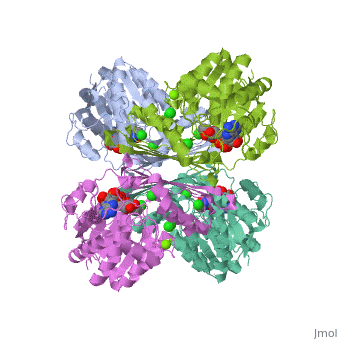User:Yash Patankar/Sandbox 1
From Proteopedia
This is a placeholder
This is a placeholder text to help you get started in placing a Jmol applet on your page. At any time, click "Show Preview" at the bottom of this page to see how it goes.
Replace the PDB id after the STRUCTURE_ and after PDB= to load and display another structure.
| |||||||||
| 3cin, resolution 1.70Å () | |||||||||
|---|---|---|---|---|---|---|---|---|---|
| Ligands: | , , | ||||||||
| Gene: | TM1419, TM_1419 (Thermotoga maritima MSB8) | ||||||||
| Activity: | Inositol-3-phosphate synthase, with EC number 5.5.1.4 | ||||||||
| |||||||||
| |||||||||
| Resources: | FirstGlance, OCA, RCSB, PDBsum, TOPSAN | ||||||||
| Coordinates: | save as pdb, mmCIF, xml | ||||||||
Hsp90 (90 kDa heat-shock protein) is one of a group of molecular chaperones responsible for managing protein folding and quality control in the crowded environment of the cell [1]. Although Hsp90 is involved in the triage of m
isfolded
proteins under stress,
it also plays a key role under normal conditions in regulating the stability and activation state of a range of ‘client’ proteins, many of which are critical for signal transduction [2]. As an extension of its protein-stabilizing role, work in model organisms shows that Hsp90 acts as a buffer or capacitor of genetic variation in morphological evolution [3]. Furthermore, there is strong evidence that Hsp90 plays an important role in disease states, particularly in cancer, where the chaperoning of mutated and overexpressed oncoproteins is critical [4]. This has driven the development of Hsp90 inhibitors for cancer treatment and, potentially, other diseases [5]. Recent systems-biology studies indicate that Hsp90 is a major interaction node, regulating a very diverse set of cellular functions [6,7]


